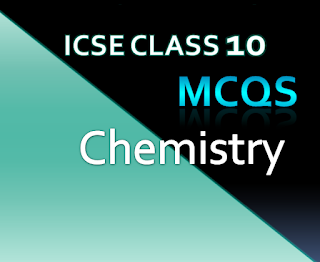ICSE CLASS 10 ACIDS BASES AND SALTS MULTILPLE CHOICE QUESTIONS
Choose the correct answer from A,B,C and D for each
of the following statements.
Question 1
Which of the following acids is not
a strong acid?
A) Hydrochloric acid
B) Carbonic acid
C) Nitric acid
D) Sulphuric acid
Question 2
A dibasic strong acid –
A) Acetic acid
B) Sulphurous acid
C) Sulphuric acid
D) Nitric acid
Question 3
The ions present in an acidic
solution:
A) Hydroxyl ions
B) Hydrogen ions
C) Ammonium ions
D) Hydronium ions
Question 4
A strong acid when dissolved in
water -
i) undergoes complete ionization
ii) undergoes partial ionization
iii) gives high concentration of
hydronium ions
iv) gives low concentration of
hydronium ions
A) i) only
B) i) and ii) are correct
C) i) and iii) are correct
D) i) and iv)
are correct
Question 5
An alkali when dissolved in water
gives _______ ions as the only ______ charged ions.
A) hydroxyl, negatively
B) hydroxyl, positively
C) Hydrogen, positively
D) Hydrogen, negatively
Question 6
Which of the following bases is
soluble in water?
A) Copper hydroxide
B) Lead hydroxide
C) Zinc hydroxide
D) Sodium hydroxide
Question 7
Ammonium hydroxide is weak alkali
because:
A) it undergoes partial
dissociation and gives high concentration of Hydroxyl ions
B) it undergoes partial
dissociation and gives low concentration of Hydroxyl ions
C) it undergoes complete
dissociation and gives low concentration of Hydroxyl ions
D) it undergoes complete dissociation and gives high concentration of Hydroxyl
ions
Question 8
When water combines with a Hydrogen
ion it forms:
A) Hydronium ion
B) Ammonium ion
C) Hydroxyl ion
D) sulphate ion
Question 9
What type of salt that dilute
Sulphuric acid can form when reacts with a base?
A) acid
salt
B) basic
salt
C) neutral
salt
D) acid
salt and neutral salt
Question10
H2SO4 + 2H2O gives
-
A) 2H+ + SO42-
B) H3O+ + SO42-
C) 2H3O+ + SO42-
D) 2H+ + SO42-
Question 11
The partial neutralization of an
acid by a base gives :
A) acid salt and water
B) acid salt only
C) acid salt and basic salt
D) neutral salt
Question 12
Which of the following is not
acidic when dissolved in water?
A) NaOH
B) NaHSO4
C) SO2
D) HCl
Question 13
Which of the following compounds
contains a low concentration of ions in its aqueous solution?
A) Acetic acid
B) Sodium hydroxide
C) Sulphuric acid
D) Nitric acid
Question 14
Match the following
i) pH = 7 a) dilute Sulphuric acid
ii) pH paper shows red b)
Sodium hydroxide
iii) Phenolphthalein turns pink c) distilled water
A) i-a, ii-b, iii-c
B) i-c, ii-b, iii-a
C) i-c, ii-a, iii-b
D) i-a, ii-c, iii-b
Question 15
When dilute Hydrochloric acid is
added to a metal carbonate it gives
A) Carbon dioxide gas
B) Sulphur dioxide gas
C) Chlorine gas
D) Hydrogen sulphide gas
Question 16
2NH4Cl + Ca(OH)2
à
A) 2NH3 + 2H2O
B) 2NH3 + 2H2O
+ CaCl2
C) 2H2O + CaCl2
D) 2NH3 + CaCl2
Question 17
A base that can be prepared by the
thermal decomposition of a metal nitrate:
A) Na2O
B) CuO
C) CO2
D) CO
Question 18
When Sulphur dioxide combines with
water it gives
A) Sulphurous acid
B) Sulphuric acid
C) Sulphur
D) Hydrogen sulphide
Question 19
Which of the following indicators
remains colourless in acidic medium?
A) Litmus solution
B) pH solution
C) Methyl orange
D) Phenolphthalein
Question 20
A mineral acid
A) Acetic acid
B) Citric acid
C) Lactic acid
D) Hydrochloric acid

No comments:
Post a Comment